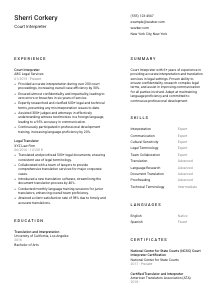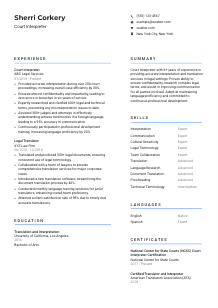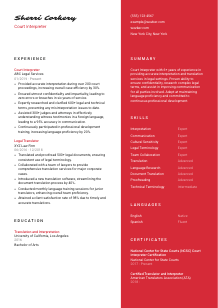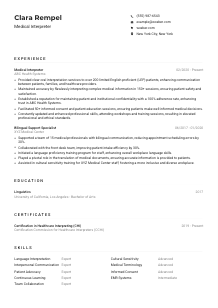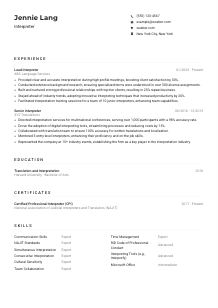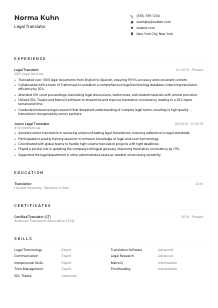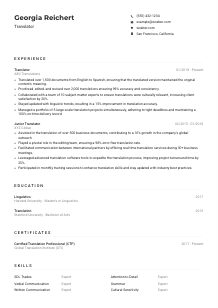Court Interpreter Resume Example
Translating legal jargon, but your resume gets lost in translation? Break the linguistic barrier with this Court Interpreter resume example, fashioned with Wozber free resume builder. Discover how effortlessly you can weave your language fluency into a legal context, so your career commands equal justice and professional admiration!
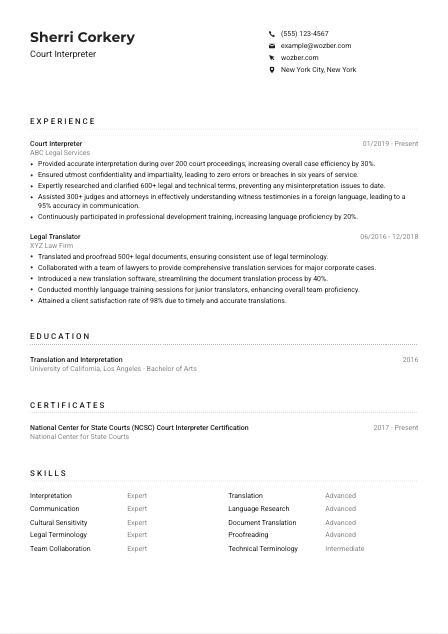
How to write a Court Interpreter resume?
Embarking on the mission to land your dream job as a Court Interpreter brings its unique set of challenges and opportunities. In a world where first impressions matter, your resume holds the power to open doors for you. It's not just a document; it's a narrative of your professional journey, laser-focused to match the court interpreter role you aspire to secure. Using the power of Wozber's free resume builder, this guide will walk you through how to meticulously craft a resume, ensuring it sings in harmony with the specific needs of the Court Interpreter position.
Ready to shape your future? Let's transform your resume into a key that unlocks new horizons.
Personal Details
The 'Personal Details' section of your resume does more than just introduce you; it sets the stage. With precision, it should reflect your alignment with the role of a Court Interpreter. Let us delve into making this section resonate with your potential employers, ensuring it strikes the right chord from the get-go.
1. Name as Your Banner
Think of your name as the headline of your professional story. Present it boldly at the top of your resume. A touch of typographic emphasis ensures it doesn't get lost in the sea of text but instead stands proud, inviting further reading.
2. Job Title Alignment
Directly under your name, tune your professional title to echo the role you're targeting. For instance, using 'Court Interpreter' as your title, exactly as it appears in the job listing, immediately aligns your profile with the job at hand and boosts the ATS-compliant resume's effectiveness.
3. Essential Contact Info
Simplify the task of reaching out to you by providing a direct phone number and a professional email address. A clean format like firstname.lastname@email.com not only looks professional but also helps avoid any ATS parsing issues.
4. Location Relevance
"Must be located in New York City, New York." When the job has a geographic requirement, echoing this in your resume assures the employer of your availability and fit. This level of detail shows you're not just aware of the prerequisites but are already one step in the game.
5. The Professional Online Persona
In today's digital age, providing a LinkedIn profile or a personal website that showcases your professional portfolio can set you apart. Ensure it's streamlined with your resume's narrative to present a cohesive professional image.
Takeaway
Your ‘Personal Details' are much more than mere formalities; they're your first virtual handshake with the hiring manager. By being meticulous and aligned with the job, you're paving the way for a memorable first impression. Remember, the devil is in the details, and in the world of Court Interpreting, every detail counts. Let's start strong!





Experience
Your Experience section is the battleground where you showcase your victories, your journey, and your growth. Tailoring this to the Court Interpreter role means picking highlights that scream relevance. Let's dig into making your professional experience not just seen but felt, leaving no doubt you're the right fit for the job.
- Provided accurate interpretation during over 200 court proceedings, increasing overall case efficiency by 30%.
- Ensured utmost confidentiality and impartiality, leading to zero errors or breaches in six years of service.
- Expertly researched and clarified 600+ legal and technical terms, preventing any misinterpretation issues to date.
- Assisted 300+ judges and attorneys in effectively understanding witness testimonies in a foreign language, leading to a 95% accuracy in communication.
- Continuously participated in professional development training, increasing language proficiency by 20%.
- Translated and proofread 500+ legal documents, ensuring consistent use of legal terminology.
- Collaborated with a team of lawyers to provide comprehensive translation services for major corporate cases.
- Introduced a new translation software, streamlining the document translation process by 40%.
- Conducted monthly language training sessions for junior translators, enhancing overall team proficiency.
- Attained a client satisfaction rate of 98% due to timely and accurate translations.
1. Job Description Breakdown
Pour over the job description, highlighting elements that align with your experience. For this Court Interpreter role, phrases like 'provided accurate interpretation during court proceedings' and 'assisted judges and attorneys' leap out. Your job is to match these with your past roles.
2. Structuring Your Professional Saga
List your roles in reverse chronological order, focusing on positions most relevant to court interpreting. Each entry should introduce the job title, the name of the organization, and your tenure there, forming a clear, easy-to-follow trajectory of your career path.
3. Crafting Achievement Bullets
Under each role, craft bullet points that match your responsibilities and achievements with the job's requirements. 'Ensured utmost confidentiality and impartiality' and 'Expertly researched and clarified 600+ legal and technical terms' are golden because they speak directly to the core duties of the Court Interpreter role.
4. The Power of Quantification
Whenever possible, add numbers to your achievements. Statements like 'Provided interpretation during over 200 court proceedings' give a tangible measure of your contribution and impact, making your experience more compelling.
5. Relevance is Key
Steer clear of listing every single task from your past jobs. Focus on experiences that mirror the responsibilities of a Court Interpreter, sidestepping unrelated achievements. This targeted approach keeps your resume focused and impactful.
Takeaway
Your 'Experience' section is where your professional story comes to life. It's about aligning your past with the present opportunity, showing a trajectory that's been leading you to this very role. By making each bullet count and directly resonating with the Court Interpreter's duties, you're not just a candidate; you're the candidate. Ready for the next step? Your story is just getting started.
Education
Your educational background lays the foundation for your career. In tailoring this section for the Court Interpreter role, you're presenting the bedrock of your qualifications. Let's align your education with your career aspirations, ensuring it resonates with the specificity and depth of the court interpreting field.
1. Highlighting Key Requirements
The job calls for a 'Bachelor's degree in Interpretation, Translation, or a related field.' Start here, prominently featuring your degree and field of study to match this requirement. This ensures the ATS and hiring manager see you've got the educational chops right off the bat.
2. Structuring with Clarity
Layout your educational background in a clear, understandable format: degree, field of study, institution, and graduation year. Simplicity is your ally in making your education easy to scan and comprehend at a glance.
3. Detailing Your Degree
Ensure the title of your degree directly aligns with the job's requirements. For instance, 'Bachelor of Arts in Translation and Interpretation' perfectly matches what they're looking for in a Court Interpreter, establishing a direct link between your education and the job.
4. Relevant Courses and Achievements
For roles demanding specialized knowledge, listing relevant courses can bolster your profile. While the broader educational qualification might cover the ground, highlighting specific courses related to legal or court interpreting can set you apart.
5. Showcasing Additional Credentials
Graduating with honors, participating in related extracurriculars, or completing relevant projects underscores your commitment and passion. Detail these achievements where they add value, seeing them as extra brushstrokes on your educational canvas.
Takeaway
In a field where precision and expertise are paramount, your education section is not just a formality—it's a testament to your readiness and fit for the role of a Court Interpreter. By aligning this section closely with the job requirements, you're underscoring your commitment to excellence and your readiness to step into the role with the right educational foundation. Let's turn the page to your next chapter.
Certificates
In the specialized field of court interpreting, certifications act as a beacon of your commitment to professional standards and continuous improvement. Tailoring this section to highlight your certifications, especially those mentioned in the job description, speaks volumes to your dedication and suitability for the role.
1. Identifying Key Certifications
First off, the job mentions 'National Center for State Courts (NCSC) Court Interpreter Certification or equivalent state certification.' If you hold this or a similar credential, it's paramount to list it upfront, showcasing your alignment with a critical requirement.
2. Selecting Relevant Certifications
Quality trumps quantity. Listing certifications that directly relate to court interpreting, such as the 'Certified Translator and Interpreter' from the American Translators Association, can significantly strengthen your profile by demonstrating your depth in the field.
3. Transparency with Dates
Including the acquisition or renewal dates of your certifications provides a timeline of your professional development. This detail can be particularly compelling, demonstrating an ongoing commitment to staying at the pinnacle of your profession.
4. Continual Learning
The landscape of court interpreting is ever-evolving. Showcasing recent or updated certifications indicates that you're not resting on your laurels but are actively engaged in keeping your skills sharp and relevant.
Takeaway
Your certificate section is the seal of approval on your expertise and professional dedication. It's not just about meeting the baseline requirements but about showing a trajectory of continuous learning and excellence. With the right certificates proudly displayed, you signal to hiring managers not only your qualification but your passion for the profession of court interpreting. Shine on – your dedication is your badge of honor.
Skills
In the arena of court interpreting, your skills define your capability to navigate the complexities of the legal language landscape. The skills section of your resume is where you get to shine a spotlight on your professional toolkit, meticulously aligned with the role's demands. Let's unpack how to articulate your skills to match the precise needs of a Court Interpreter.
1. Deciphering Job Requirements
Begin by dissecting the job listing for both explicit and implicit skill requirements. Skills like 'Interpretation,' 'Communication,' and 'Cultural Sensitivity' are not just buzzwords; they are essentials in your role as a Court Interpreter.
2. Matching and Showcasing
Take the skills extracted from the job description and match them with your own. Skills such as 'Legal Terminology' and 'Team Collaboration' directly mirror the job's requirements, showcasing your readiness to hit the ground running.
3. Organizing for Impact
Resist the urge to list every skill you possess. Instead, focus on the most relevant ones for a Court Interpreter. A well-organized and focused skills section makes it easier for hiring managers (and ATS systems) to recognize your fit for the role at a glance.
Takeaway
Your skills are the core of your professional identity. Highlighting the ones that align with the role of a Court Interpreter not only proves your suitability but also your keen understanding of the job's nuances. Embrace this section as a chance to let your professional prowess shine, confidently showcasing the tools you bring to the table. Your skills are your strength; let them speak for you.
Languages
In the world of court interpreting, language is more than a medium—it's your domain. The languages section of your resume is a showcase of your linguistic diversity and expertise, a critical component in your professional toolkit. Let's align your linguistic prowess with the needs of a Court Interpreter role, ensuring it resonates with the global scale of your competencies.
1. Language Prerequisites
The job mandates 'Proficiency in both spoken and written English and the target language(s) (usually Spanish).' Begin by listing these essential languages, clearly indicating your level of proficiency to meet the job's core linguistic requirements.
2. Prioritizing Essential Languages
Highlight your proficiency in the required languages at the top of the section, making sure to label your level of fluency. This instantly communicates your compliance with one of the job's primary needs.
3. Showcasing Multilingual Skills
If you speak additional languages, list them to exhibit your broad linguistic capabilities. While the job may specify certain languages, additional languages highlight your versatility and global communication skills.
4. Honesty in Proficiency
Be clear and honest about your language proficiencies using terms like 'Native,' 'Fluent,' 'Intermediate,' and 'Basic.' This ensures a transparent representation of your language skills and sets realistic expectations.
5. The Role's Scope
Understanding the role's scope can help you tailor this section effectively. For positions involving work with diverse populations or requiring interaction in multiple languages, showcasing your multilingual talents can significantly bolster your candidacy.
Takeaway
Your ability to communicate across cultures and in various languages is not just a skill—it's a testament to your ability to bridge worlds. In the realm of court interpreting, your languages are your tools, your art, and your gateway to making a meaningful impact. Celebrate and flaunt your linguistic capabilities, for they open a world of possibilities and showcase you as a global professional. Let your languages tell a story of connection and understanding.
Summary
The summary section is your chance to distill your professional essence into a potent snapshot. For a Court Interpreter, this means weaving together your experience, skills, and unique value proposition into a narrative that captivates and resonates with hiring managers. Let's craft a summary that opens doors and sets the stage for your career journey.
1. Grasping the Job's Soul
Start by internalizing the essence of the Court Interpreter role. Understand the blend of skills, experiences, and qualities that make an ideal candidate. This understanding forms the foundation of your summary.
2. Crafting Your Opening
Begin with a strong introductory statement that outlines your professional identity and core competencies. For instance, stating you're a 'Court Interpreter with 6+ years of experience in providing accurate interpretation and translation services in legal settings' instantly captures attention and sets the context.
3. Highlighting Your Uniqueness
Detail your accomplishments and skills that directly speak to the job's requirements. Emphasize traits like 'ensuring confidentiality,' 'researching complex legal terms,' and 'maintaining language proficiency,' which are vital to the role.
4. Conciseness is Key
While it's tempting to include every achievement, the summary is not the place for exhaustive detail. Aim for a clear, compelling snapshot that entices hiring managers to dive deeper into your resume. This section is your hook, make every word count.
Takeaway
Your summary is the opening act of your professional narrative. By carefully tailoring it to the specific nuances of the Court Interpreter role, you not only grab attention but also demonstrate your exact match for the job. This section is your moment to shine, to distill your professional journey into a narrative that compels and captivates. Craft it with care, and watch as it paves the way to opportunities that align with your expertise and passions. Your journey as a Court Interpreter is just beginning – let's make it remarkable.
Launching Your Court Interpreter Journey
Congratulations on completing this comprehensive journey through tailoring your resume for the coveted role of a Court Interpreter. With each section polished to perfection, your resume is now a finely tuned instrument, ready to play the symphony of your career. Embrace this process as a crucial step towards your goals, leveraging the power of Wozber's free resume builder, ATS-friendly resume template, and ATS resume scanner to ensure your resume is not only beautiful but also ATS-compliant. The doors of opportunity swing wide open for those prepared to walk through them. Craft your resume with precision, passion, and a touch of personal flair, and step confidently into the world of court interpreting.
Your skills, experience, and dedication have prepared you for this moment. The stage is set, and the spotlight is yours. Go forth, make your mark, and let your career in court interpreting be a testament to the power of a resume built with care, insight, and Wozber's dedicated tools. Your future awaits, and it looks brighter than ever.

- Bachelor's degree in Interpretation, Translation, or a related field.
- National Center for State Courts (NCSC) Court Interpreter Certification or equivalent state certification.
- Minimum of 3 years' experience in legal or court interpreting.
- Proficiency in both spoken and written English and the target language (s) (usually Spanish).
- Strong interpersonal and communication skills, with attention to accuracy and cultural sensitivity.
- Must be located in New York City, New York.
- Provide accurate interpretation during court proceedings, depositions, and other legal proceedings.
- Ensure confidentiality and impartiality in all court matters.
- Research legal and technical terms to guarantee the use of the appropriate interpretations.
- Assist judges and attorneys in understanding witness testimonies and documents in a foreign language.
- Maintain proficiency through professional development training and participation in language practice sessions.





